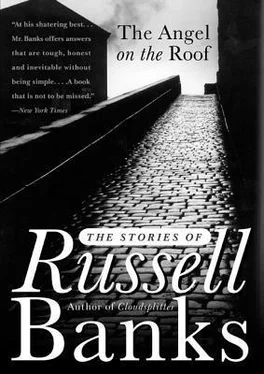“I can dig it,” Noonan said somberly, although he himself had not been in Vietnam.
“You get used to it, though. And then it turns out to be like life. I mean, there’s you, and there’s everybody else. Only, unlike the way it is for everybody else, this happened to me in a flash, not over years and so slow you don’t even realize how true it is. Know what I mean?”
“How true what is?”
“Well, just that there’s you, and there’s everybody else. And that’s life.”
“Sure, I can understand that.” He turned away from the tank and looked into Stacy’s blue eyes. “It’s the same for me. Only with me it was on account of this goddamned bear. Did I ever tell you about the bear that tore my camp down?”
She said, “No, Noonan. You didn’t.”
“It’s the same thing, like getting struck by lightning and afterwards feeling like you’re a changed man.” It was years ago, he said, when he was between marriages and drinking way too much and living in his hunting camp up on Baxter Mountain because his first wife had got the house in the divorce. He got drunk every night in town at the Spread Eagle or the Elm Tree or the old Dew Drop Inn, and afterwards, when he drove back to Baxter Mountain, he’d park his truck at the side of the road, because the trail was too rough even for a four-by-four, and walk the two miles through the woods to his camp. It was a windblown, one-room cabin with a sleeping loft and a woodstove, and one night, when he stumbled back from the village, the place had been trashed by a bear. “An adolescent male, I figured, it being springtime, who’d been kicked out of his own house and home. Not unlike myself. I had a certain sympathy for him, therefore. But he’d wrecked my cabin looking for food and had busted a window going out, and I knew he’d come back, so I had to take him down.”
The next evening, Noonan blew out his kerosene lantern, climbed into the sleeping loft with a bottle of Jim Beam, his Winchester 30.06, and his flashlight, and waited. Around midnight, as if brushing away a cobweb, the bear tore off the sheet of polyurethane that Noonan had tacked over the broken window, crawled into the cabin, and made for the same cupboard he’d emptied the night before. Noonan, half-drunk by now, clicked on his flashlight, caught the startled bear in its beam, and fired, but only wounded him. Maddened with pain, the bear roared and stood on his hind legs, flinging his forelegs in the air right and left, and before Noonan could fire again, the animal had grabbed onto a timber that held up the loft and ripped it from its place, tearing out several other supporting timbers with it, until the entire cabin was collapsing around Noonan and the wounded bear. The structure was feeble anyhow, made of old cast-off boards tacked together in a hurry twenty years ago, never rebuilt, never renovated, and it came down upon Noonan’s head with ease. The bear escaped into the night, but Noonan lay trapped under the fallen roof of the cabin, unable to move, his right arm broken, he assumed, and possibly several ribs. “That’s when it happened,” he said.
“What?” Stacy dipped a dozen beer mugs two at a time into cold water, pulled them out, and stuck them into the freezer to frost for later on.
“Just like you said. It changed my life, Stace.”
“No kidding. How?” She refilled the salt shakers on the bar.
“Well, I stopped drinking, for one thing. That was a few years later, though. But I lay there all that night and most of the next day. Until this beautiful young woman out looking for her lost dog came wandering by. And, Stace,” he said, his voice suddenly lowered, “I married her.”
She put her fists on her hips and checked him out. “Seriously?”
He smiled. “Well, yeah, sort of. I’d actually known her a long time beforehand, and she’d visited me a few times at my camp, let us say. But, yeah, I did marry her … eventually. And we were very happy. For a while.”
“Uh-huh. For a while.”
Noonan nodded, smiled, winked. Then bumped her hip with his and said, “I gotta get the kitchen set up. We can pursue this later, Stace. If you want.”
She didn’t answer. She started slinging bottles of beer into the darkness of the cooler, and when she next looked up, he was gone, and a pair of road workers were coming through the door, hot and sunburned and thirsty.
The day had been clear with wispy fantails of clouds in the east, promising a soft, late-summer sunset over the mountains for the folks dining out at Noonan’s Family Restaurant. It was unusually busy that evening, even for Lobster Night. Depressed by a quarrel earlier with her pregnant daughter over money, Gail fell quickly behind in her orders and, after being yelled at, first by her hungry customers in the dining room and then by Noonan in the kitchen, where seven or eight bright red lobsters on their platters awaited pickup, she broke down and ran sobbing into the ladies’ room. She came out, but only after Stacy went after her and promised to help in the dining room, where fifteen kids from three unrelated French Canadian families were banging their silverware rhythmically against their glasses. Back in the kitchen, halfway into the supper hour, Donny LaPierre threw down his dish towel and told Noonan to take his job and shove it, he didn’t graduate high school just to get treated like an idiot for minimum wage. His younger brother Timmy, who would graduate the following year, high-fived Donny and said, “Whoa! Way cool, DL,” and the two walked out together.
Noonan stood at the door and bellowed, “Don’t even think about gettin’ paid for this week!” and the boys gave him the finger from the parking lot and laughed and started hitching to Lake Placid.
Eventually, Gail and Stacy, between them, got everyone satisfactorily served, and the diners and their children quieted down, and order was restored, even in the kitchen — where Noonan, almost grateful for the chance to do it right, took over the dishwasher’s job himself. At the bar, four bored, lonely regulars, men of habit, were drinking and smoking cigarettes and watching Montreal lose to the Mets on television. Stacy gave them a round on the house for their patience, and all four smiled and thanked her and resumed watching the game.
In the fish tank, the one last lobster bumped lazily against the glass. Stacy wiped down the bar and came to a slow stop by the tank. She leaned down and gazed into what she believed was one of the lobster’s eyes — more of a greenish knob than an eyeball, anatomically absurd to her — and tried to imagine what the world of Noonan’s Family Restaurant looked like through that knob and the thirty-gallon cell of cloudy water surrounding it and beyond that the lens of the algae-stained glass wall. It probably looks like an alien planet out here, she thought. Or incomprehensibly foreign, like some old-time Chinese movie, so you don’t even know what the story’s about, who’s the good guy and who’s the bad guy. Or maybe, instead of an actual place or thing, to a lobster it looks like only an idea out here. That scared her.
There must be some kind of trade-off among the senses, she reasoned, like with blind and deaf people. If one sense is weak, another must be strong, and vice versa. Lobsters, she figured, probably couldn’t see very well, living as they did way at the dark bottom of the sea. To distinguish food from friend and friend from foe, they would need powerful senses of smell and hearing. She brought her face up close to the glass and almost touched it with her nose. The lobster bobbled and jiggled just beyond, as if struggling to use its weak eyes and tank-impaired hearing and olfactory senses to determine if Stacy was a thing that could eat it or breed with it or be eaten by it. So much in the life of any creature depends upon being able to identify the other creatures accurately, Stacy thought. In the tank, and out of it, too. And this poor beast, with only its ridiculous eyes to depend upon, was lost; was wholly, utterly, lost. She reached toward the lobster, as if to pat it, to comfort and reassure it that she would not eat it, and she could not breed with it, and would not make a decent meal for it, either.
Читать дальше












